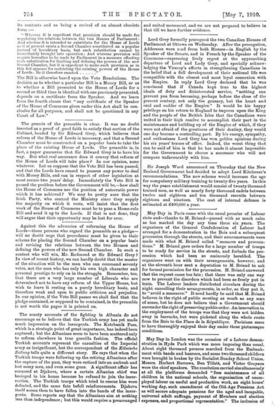The genesis of the preamble is clear. It was no
doubt inserted as a proof of good faith to satisfy that section of the Cabinet, headed by Sir Edward Grey, which believes that reform of the House of Lords is necessary, and that a Second Chamber must be constructed on a popular basis to take the place of the existing House of Lords. The preamble is, in fact, a paper guarantee that Sir Edward Grey is to have his way. But what real assurance does it convey that reform of the House of Lords will take place P In our opinion, none whatever. Let us suppose that the Veto Bill has been passed,' and that the Lords have ceased to possess any power to deaf with Money Bills, and can in respect of other legislation at most secure two years' delay. Immediately the Veto Bill is passed the problem before the Government will be,—how shall the House of Commons use the position of autocratic power which it has achieved? We may be pretty sure that the Irish Party, who control the Ministry since they supply the majority on which it rests, will insist that the first work of the House of Commons must be to pass a Home-rule Bill and send it up to the Lords. If that is not done, they will argue that their opportunity may be lost for ever.










































 Previous page
Previous page